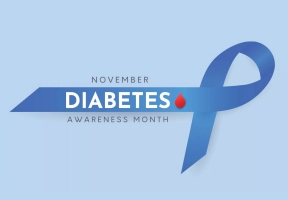By: Ashmar Mandou
 November is Diabetes Awareness month and there are a several lifestyle changes that can help prevent type 2 diabetes, the most common form of the disease. If you’ve been diagnosed with prediabetes — high blood sugar that doesn’t reach the level of a diabetes diagnosis — lifestyle changes can prevent or delay type 2 diabetes. Making a few changes in your lifestyle now may help you avoid serious diabetes health complications in the future.
November is Diabetes Awareness month and there are a several lifestyle changes that can help prevent type 2 diabetes, the most common form of the disease. If you’ve been diagnosed with prediabetes — high blood sugar that doesn’t reach the level of a diabetes diagnosis — lifestyle changes can prevent or delay type 2 diabetes. Making a few changes in your lifestyle now may help you avoid serious diabetes health complications in the future.
Lose Extra Weight
Losing weight lowers the risk of diabetes. The American Diabetes Association recommends that people with prediabetes lose at least 5% to 7% of their body weight to prevent diabetes. More weight loss can turn into even greater benefits. Set a weight-loss goal based on your current body weight. Talk to your healthcare professional about reasonable short-term goals and expectations. For example, aim to lose 1 to 2 pounds a week.
Be More Physically Active
Goals for most adults to promote weight loss and keep a healthy weight include:
• Aerobic activity. Aim for about 30 minutes or more of moderate aerobic activity — such as brisk walking, swimming or biking — on most days of the week. Get at least 150 minutes of moderate aerobic activity a week. Or get at least 75 minutes of vigorous aerobic activity — such as running or swimming laps — a week.
• Strength training. Do strength training for all major muscle groups at least two times a week to increase your strength, balance and skills to keep an active life. Try to spread out your strength training through the week. Strength training can include lifting weights and doing body weight exercises such as squats.
• Balance training. For older adults, doing balance training two or three times a week can help keep range of motion and lower the risk of falls.
Eat Healthy Fats
Avoid eating many fatty foods that are high in calories. To help lose and manage weight, your diet should include a variety of foods with unsaturated fats. These are sometimes called healthy fats. Unsaturated fats — both monounsaturated and polyunsaturated fats — promote healthy blood cholesterol levels and good heart and vascular health. Healthy fat sources include:
• Olive, sunflower, safflower, cottonseed and canola oils.
• Avocados.
• Nuts and seeds, such as almonds, peanuts, flaxseed and pumpkin seeds.
• Fatty fish, such as salmon, mackerel, sardines, tuna and cod.









